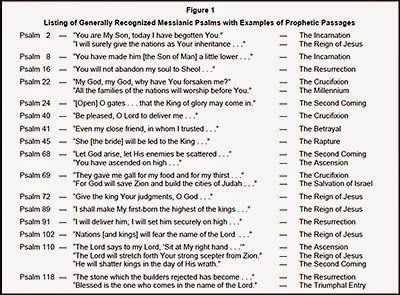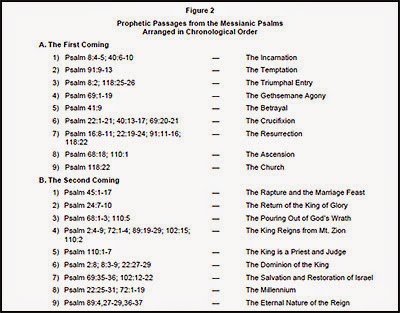When teaching on the importance of Bible prophecy, one of the points I always mention is the quantity of prophecy that the Bible contains. I stress that anywhere from one-fourth to one-third of all the Scriptures are prophetic in nature, and that fact alone should be sufficient to compel our study of prophecy. I then remind my audience that we are told in 2 Timothy 3:16-17 that “All Scripture is inspired by God and profitable for teaching, for reproof, for correction, for training in righteousness; so that the man of God may be adequate, equipped for every good work.” And “all Scripture” certainly includes prophecy.
Most Christians are completely unaware of how much of the Bible is devoted to prophecy, just as most are unaware of the fact that the Bible is the only book in the world that contains fulfilled prophecies. There are, for example, no fulfilled prophecies in the Quran, the Hindu Vedras or the Book of Mormon. In contrast, the Bible contains hundreds of prophecies that have already been fulfilled — prophecies about people, towns, nations, empires and the Messiah.
Getting back to the quantity of prophecy, consider the fact that one out of every 25 verses in the New Testament have to do with the Second Coming of Jesus. And the Gospels are full of prophecies about Jesus’ death, burial and resurrection.
The New Testament contains entire books dedicated to prophecy — like 1 and 2 Thessalonians and Revelation. The Gospels contain lengthy passages devoted to prophecy. Consider, for example, Matthew 24-25, Mark 13, Luke 21 and John 14-17. Other lengthy prophetic passages are scattered throughout the New Testament — Acts 1, Romans 9-11, 1 Corinthians 15, 1 Timothy 4, 2 Timothy 3-4, Titus 2, 1 Peter 1 & 4 and 2 Peter 3.
In the Old Testament, we immediately think of the Major and Minor Prophets — a total of 16 books. But these books are not the only ones in the Hebrew Scriptures that contain prophecy. Major prophetic passages can be found in the history books, a good example being Deuteronomy 28-30 where Moses prophecies that the Jewish people will one day be scattered worldwide and they will be persecuted wherever they go, but they will be preserved and regathered to their homeland.
The history books also contain Messianic prophecies. The virgin birth of the Messiah is prophesied in Genesis 3:15. In Deuteronomy 18:15-18 Moses prophesied that the Messiah would be a prophet. In Genesis 12:1-3 God promised Abraham that the Messiah would come through his lineage, and in Genesis 49:8 Jacob prophesied that the Messiah would come from the tribe of Judah. The prophecy that the Messiah would come from the house of David within the tribe of Judah is stated in 2 Samuel 7:8-16.
The Neglected Prophecies
Perhaps the most overlooked area of the Old Testament with regard to prophecy is the book of Psalms. It’s a major repository of Messianic prophecies concerning both the First and Second Advents of the Messiah. Some are direct and clear. Others are indirect and subtle.
Most scholars acknowledge that 16 of the Psalms are distinctly Messianic in nature. They are listed below in Figure 1.

All but three of these Psalms are directly quoted in the New Testament and applied to Jesus. The three not quoted are Psalm 24, Psalm 72, and Psalm 89. The most frequently quoted is Psalm 110. It is mentioned a total of fourteen times in the New Testament, more than any other Old Testament passage. Three other of these Messianic Psalms are mentioned frequently in the New Testament. They are Psalms 2 and 69, mentioned seven times each, and Psalm 118 which is cited a total of six times.
Together, these 16 Messianic Psalms present a panoramic survey of the First and Second Comings of Jesus. Figure 2 presents passages from these 16 psalms arranged in chronological order according to the events in the life of Jesus.

Other Messianic Psalms
The Messianic prophecies in the Psalms are by no means limited to the 16 which are referenced above. I would add the following 17 Psalms to the list as ones that are obviously Messianic in nature, relating to the Lord’s Second Coming:
- Psalms 18 and 21— Contain vivid and detailed descriptions of the Lord’s return in wrath. (Psalm 18:7-19 and Psalm 21:8- 13)
- Psalm 46 — Pictures the exalted Lord in the midst of Jerusalem following His triumphant return.
- Psalm 47 — A song of joy celebrating the Lord’s reign as King of kings.
- Psalm 48 —The beauty of millennial Jerusalem.
- Psalm 76 — A description of the battle of Armageddon.
- Psalms 95, 96, 97, 98, 99 — Songs of joy celebrating the Lord’s reign over the nations.
- Psalms 145, 146, 147, 148, 149, 150 — Praise songs celebrating the glory, majesty, and goodness of the Lord’s reign.
The addition of these 17 Psalms gives us a total of 33 Messianic Psalms. But even these 33 do not exhaust the rich treasure of prophetic material that is contained in the Psalms. In fact, the fundamental prophetic theme of the Psalms is not even reflected in any of the Messianic Psalms thus far identified.
In the second part of this series on prophecy in the Psalms, we’ll look at the prophetic themes found in that book.







